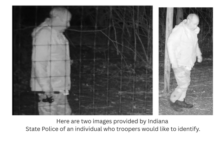Kosciusko County Council gave their OK Thursday evening for Ken Jones, president and CEO of Jones Petrie Rafinski Corp. (JPR), to draw up a budget for an East Webster Lake regional sewer district.
It’s an early first step in the possible creation of the sewer district with more to come. Jones presented a proposal for the sewer district to the County Commissioners Feb. 15.
On Thursday, Jones said, “So tonight, I wanted to talk to you a little bit about another infrastructure project that is being advanced by a group of property owners at east Webster Lake.”
He said part of the lake is in the town of North Webster and part is in the county. Almost the entirety of the lake has already had sewer made available to it, except for the east shore.
“As we were going through the public process of forming the district for the Tippecanoe-Chapman Lakes Regional Sewer District, we were approached by a group of homeowners out there that had the same kind of issues,” Jones said.
There’s 183-185 homes on the east side of the lake that are “remote” from any sanitary sewer and are “completely” in the county, he said. JPR did a preliminary engineering review, he said, and he began working with about 25 property owners initially. That has grown to a core group that is working on advancing the potential for building a sanitary sewer there, Jones said.
They looked at the potential for extending a sewer from the town of North Webster, considered whether the property could be annexed into the town, but “both of those resulted in a negativity conclusion,” he said. The town’s sewer also ends “significantly west of this location.”
“However, there is a sanitary sewer that touches the north boundary of this neighborhood on the east side that comes all the way from Knapp Lake in Noble County and connects to the town of North Webster sewer,” Jones said.
He said they began discussions between the east Webster Lake property owners and the folks at Knapp Lake, as well as the town of North Webster, as to whether the area could be served by tying into the existing sanitary sewer.
“It turns out that when they planned the project at Knapp Lake, which is about the same size of the project that we are considering here, they had set aside enough volume and actually purchased capacity from the town of North Webster that would make room for this group. They only used about half, maybe less than half, of the capacity in that pipe. So, based on our analysis, it does look like we could make a connection there, right there at the north edge of the neighborhood,” Jones said.
That would require an agreement between a new municipal entity of some sort at the East Webster Lake, an agreement with Knapp Lake and then an update to the agreement between Knapp Lake and the town of North Webster.
“Before we can advance a rural utility project, we need to have a legal entity,” Jones said. They approached all three existing regional sewer districts in the county to ask if there was any interest in bringing those folks at East Webster Lake into one of the districts, but all three district boards declined.
“That leaves us with one choice,” he said, and that is asking the County Commissioners and Council to consider supporting another regional sewer district in the county that would “allow this project to proceed.”
All of the necessary pre-petition work would still need to be completed, including the completion of a full preliminary engineering report. A rate report would need to be completed to accompany a petition that also would need developed.
“Before we started to develop a budget for this work, we wanted to first found out if the County Commissioners had an interest in that. And then, of course, they said you’ve got to come see the Council, too,” Jones said, adding that they wanted support from both county government bodies.
From JPR’s standpoint, if they are asked to prepare a preliminary engineering report, he said it would be around $25,000. In talking with Baker Tilly, if they are the rate consultant, they’re probably going to be in the $10,000 range. Jones didn’t have a figure for legal counsel that was required to prepare and file the petition.
“All you would need to do tonight – I’m not asking you to approve any amount, I’m just saying here’s what we think – if you are interested in considering this, then I will go complete the budget development and then go back to the County Commissioners and then come back to you one more time,” Jones said.
The project cost was estimated at $4.4 million. Any funds the county provides in advanced would be reimburseable through the process.
After a little more discussion, the Council voted unanimously for Jones to put together a budget.
He also gave the Council an update on the Tippecanoe Chapman Regional Sewer District, saying it’s going “exceedingly well.” Design began in mid-2021, and it’s complete and is in for permits. The project is waiting for the permitting to come back, and then the project will be bid out, possibly in the next 30-45 days.
It is connecting to the city of Warsaw near the Municipal Airport. About 90% of all the property owner easements that are required have been acquired, as well as 100% of the roadway right-of-way.
“So there’s nothing at this point in time that’s going to keep us from going forward,” Jones said.
Somewhere between 1,900 to 2,000 septic sewers will be eliminated and regionalized with an existing wastewater facility that has the capacity to receive it, he said.
The sewer district project cost is estimated at around $41 million, with about $12 million in grants from the USDA and $2.5 million from State Revolving Fund. The balance will be a 30-year loan for about $2.5 million from SRF and the balance from USDA, both low-interest and long-term loans.
Closing on financing is hoped to be sometime in July, with construction beginning in late summer or early fall.
In other business, the Council:
• Approved a request for additional appropriations from American Rescue Plan Act dollars by County Administrator Marsha McSherry. She said the figures were approved by the ARPA Committee and Commissioners and needed approval by the Council.
They include $25,000 for a grant for LaunchPad; $200,000 for the Justice Building fire alarm system; $120,000 for jail showers; $30,002 for the Sophos MTR Cybersecurity; and $222,795 for the radio tower connectivity.
• Approved a request from Council Vice President and Kosciusko County Redevelopment Commission President Joni Truex for additional appropriations to cover legal services for the Redevelopment Commission that total $12,500.
• Approved to adopt the 2023 budget in October. The Council budget discussions with department heads will be scheduled for 8 a.m. to 4 p.m. Aug. 25. Department heads will be instructed to add a 10% increase in wages for employees for 2023 for budgeting and advertising purposes only.
• Approved to increase the veteran service officer hours from 21 a week to 29 for 2022 because of extra work Darryl McDowell has been doing; increasing an annual salary for a yet-to-be-hired IT Department employee from about $51,000 to $66,000; and increasing wages for some part-time employees at the Kosciusko County Highway Department as the county can’t find employees at the current wages offered.
• Approved a request from McSherry to transfer $50,000 from Contracts IT to Computer Maintenance in the County Cumulative Capital Development Fund for accounting purposes.
• Approved two salary ordinance amendments for the maintenance department, as requested by McSherry. The first one is for an annual salary of $53,020 for a full-time person who is moving to a sixth-year level. The second one is for $23.37 an hour for a part-time person who is going to a three-year level.
• Approved Community Corrections Director Barry Andrew’s request to apply for annual grants through the Indiana Department of Corrections. One grant is for $350,755 for home detention and the other is for $75,746 for the drug court. The Commissioners approved the grant applications March 29.
• Approved all three grant application requests as presented by Kosciusko County Sheriff’s Office Chief Deputy Shane Bucher. They included a federal reimbursement grant of $12,500 from the Comprehensive Hoosier Highway’s Injury Reduction Program (CHIRP) for the Stop Arm Violation Enforcement; a $16,000 matching grant from the state of Indiana for body camera replacement; and a $4,900 matching federal grant from the Small Rural Tribal Agency, also for body camera replacement. The Commissioners approved the grant application requests April 12.




